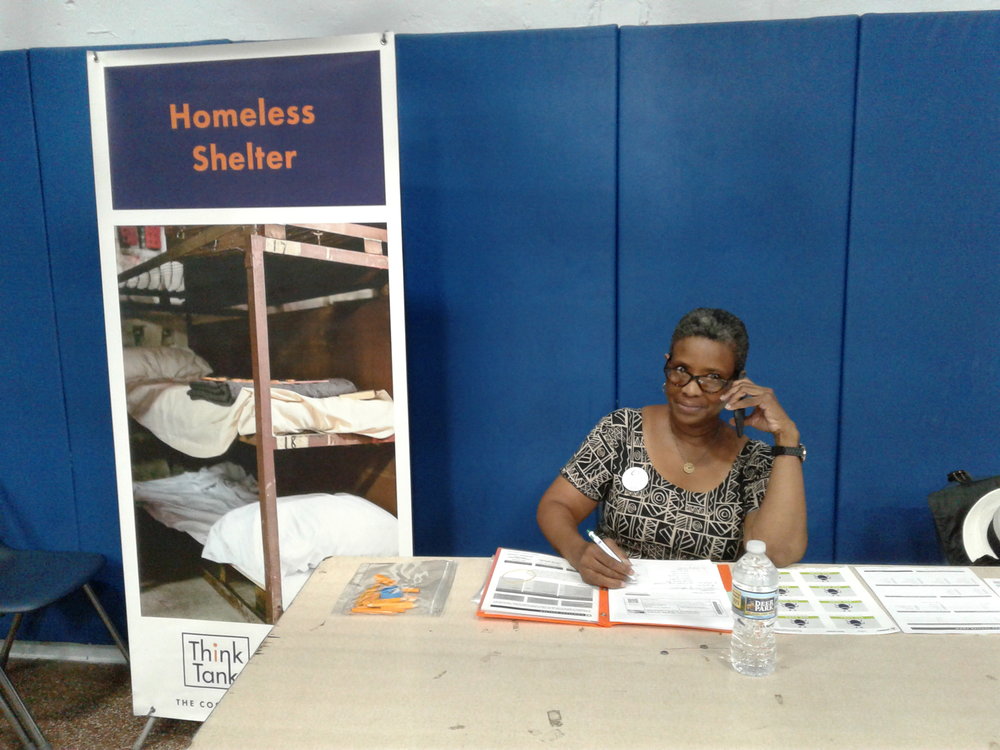NEOCH Staff Participate in Cost of Poverty Experience
COPE: Cost Of Poverty Experience
“The over committed can miss a few deadlines. Dieters can take a break from their diet. The busy can take vacations. One cannot take a vacation from poverty.” -Scarcity: Why Having Too Little Means So Much by Sendhil Mullainathan
The Cost of Poverty Experience is a training that offers participants a glimpse into the lives of low-income individuals and families living in our community. It is a look into the obstacles that are faced, the decisions that are made, and the consequences that impact these families every day. The CareSource Foundation has partnered with Think Tank (an Ohio non-profit) to develop COPE, which was co-designed with low-income individuals who have shared their story so that participants could gain greater understanding. Greater Cleveland Community Shares was the local host of this poverty experience.
 Joyce Robinson oversees the shelter experience photo by Dawn Ramsey
Joyce Robinson oversees the shelter experience photo by Dawn Ramsey
The exercise, which simulated one month of poverty, was broken up into four, 15-minute "weeks". 45 different types of “family units” consisted of 1, 2, 3, 4, or 6 members including adults, youth and school-age children. Each "family" was given instructions regarding circumstances specific to them. Adults were employed or unemployed but seeking work; youth and children had to attend school, as well as experience a "week-long" school break.
Fourteen stations represented services a typical low-income family would use- minimum wage employer(s), county human services, rent and mortgage/evictions, police and jail, court and probation services, pawn shop, bank and loan, gas stop, family wellness center, faith center, mega mart, community services, homeless shelter, school. Each station had its own set of rules regarding how to handle/deal with clients, as well as its own agency-appropriate props; i.e. the Homeless Shelter had six "beds", a "Do Not Shelter List" of clients who didn’t obey the rules, a "Homeless Shelter Form" to completes, a list of "Shelter Rules" to dispense, as well as “bedbugs” for those who were in the shelter for more than one week.
Prior to the start of the exercise, when participants were asked "What is Poverty?" responses included: lacking, struggling, violence, choices, hunger, sustainability, chaos, fear confusion. At the end of the exercise, when asked again, "What is Poverty?" responses included anxiety, increased heart rate, and frustration.
Participants who played the roles of adults talked about spending a lot of time just waiting, having a lot of "balls in the air", lack of understanding regarding resources available, having to make decisions quickly, always being behind, not having enough time, not having enough money at the end of the month, being rejected or charged more for services. They also spoke of parents as being strong, hard-working and resilient.
Those who played the roles of children talked about the stress of being alone a lot because parents had to work, having a lot on their plates, and that the primary relationships they had with adults were not with their parents, but with people "in the system," such as teachers and social service workers.
Systemic barriers can help cause or perpetuate poverty. As systems and as individuals, organizers of the event said, "We are isolated. We need to think about how relationships, between the system and individuals can help to create community. Instead of talking at each other, insisting that the 'other side’ listen to us, we need to talk with each other and listen to what the other has to say."
Overall, I thought this demonstrated how you cannot take a break from poverty. This showed everyone that from the time you wake up until the time you go to bed, you have to deal with the ripples that come from living in poverty.
by Joyce Robinson
Posts reflect the opinion of those who sign the entry
